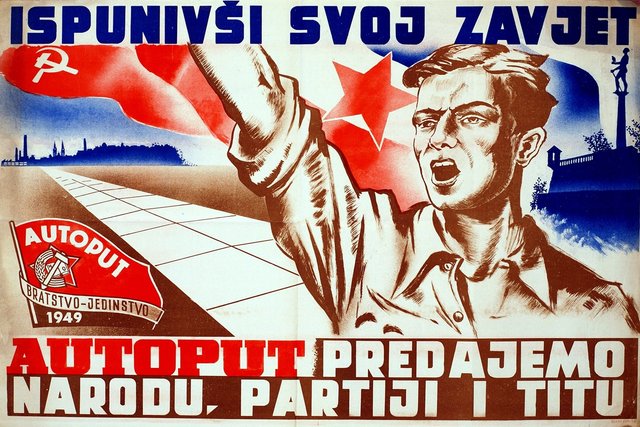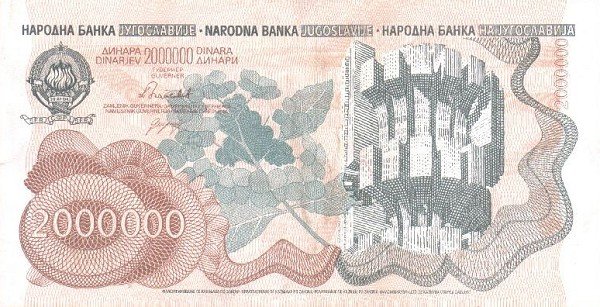Yugoslavia
Most of us in the U.S.A. don't know much about Yugoslavia. Myself, all I really remembered was when, as Michael Parenti put it:
In 1999, the U.S. national security state — which has been involved throughout the world in subversion, sabotage, terrorism, torture, drug trafficking, and death squads — launched round-the-clock aerial attacks against Yugoslavia for 78 days, dropping 20,000 tons of bombs and killing thousands of women, children, and men. (Parenti)
I was 16 when Clinton was dropping bombs on Yugoslavia... I didn't know about its history as a state existing as a buffer between the USSR and the West. Yugoslavia was something of an exception during World War 2, in that it repelled the Nazis with minimal help from the Soviet Union. Most of the rest of Eastern Europe relied heavily on the Red Army to fight off the fascists.
As a result, they were able to retain their autonomy after the war, far beyond that of any of their neighbors. They were able to implement their own brand of socialism independently.
But in 1945 Yugoslavia had few industries and no widespread working class. It was still an almost entirely agricultural peasant country. Most people were farmers in long standing communities, subsistence farmers who commonly also planted some cash crops if they had land to do that. (Curl)

Market Socialism In Yugoslavia
Yugoslavia was able to make great advances under the market socialist economy that was instituted in the aftermath of WWII. After a brief initial period of independenly implementing Soviet-style communism,
Yugoslavia began instituting a series of economic and political reforms based on empowering people in their workplaces and communities. This was a move away from the top-down Soviet-style command economy. Taking the Paris Commune of 1871 as a role model, the Yugoslavs tried to invent a form of socialism that combined socialist planning with workplace democracy: they called it workers’ self-management. (Curl)
While the government did determine many aspects of the worker run enterprises, the level of democracy in the workplace was remarkable.
All workers elected their own managers and maintained a significant level of control over their workplace, while the central government still owned all the enterprises. Workers could directly implement many ideas and initiatives at their place of work. The workers’ collective controlled how a significant portion of the profit (“social surplus”) of their enterprise was to be spent, how much would go for salaries, and how to relegate the rest. (Curl)
The efforts were a huge success, and the country was able to rapidly industrialize.
Between 1960 and 1980 it had one of the most vigorous growth rates: a decent standard of living, free medical care and education, a guaranteed right to a job, one-month vacation with pay, a literacy rate of over 90 percent, and a life expectancy of 72 years. Yugoslavia also offered its multi-ethnic citizenry affordable public transportation, housing, and utilities, with a not-for-profit economy that was mostly publicly owned. (Parenti)
Shift Towards Greater Marketization
As the economy grew and the early efforts at integrating market forces into socialism were continued and expanded, regional disparities began to become more pronounced. The competition for resources intensified ethnic nationalist sentiments, while regional planners were often corrupt and used their position for personal enrichment. The instability caused by the resulting poor planning brought the country towards an economic crisis.
In 1965, the government started to implement reforms that further decentralized and liberalized the economy. The banking system was decentralized along with economic planning. Enterprises were allowed to fail for the first time, and open competition between the self-managed enterprises was permitted. More economic decisions were left up to the enterprises and government funding was distributed on a local level rather than allocated from a central investment fund.
The economy became more integrated into the international market, which provided access to investment from Western banks. Struggling enterprises were able to negotiate directly with financial institutions, bypassing the government.
Eventual Failure
Market socialism was remarkably successful by some yardsticks. Yugoslavia had been a poor agricultural country with life expectancy of 50 and illiteracy at 75 percent, but by the late 1960s was an industrialized, urban, and literate county with one of the fastest growth rates in the world and a life expectancy of 70. Six million people left their villages and found work in the cities and towns.
But market forces also led to unemployment, increased inflation, growing foreign debt, social and class inequality, and exacerbated the divide between the regional republics. Meanwhile, the dismantling of the agricultural collectives resulted in significantly increased rural inequality. (Curl)
The recession of the mid-70s devastated economies around the world. Yugoslavia was hit particularly hard, and the government responded by further decentralizing the economy. The unfortunate result was that enterprises prioritized their personal interests above the greater good of society.
The recession forced many enterprises and republics in Yugoslavia to take on large debts. The infusion of foreign capital caused a credit bubble to form, which inevitably burst towards the end of the decade. Finally, the economy was completely dismantled.
The International Monetary Fund and World Bank came to Yugoslavia to force repayment of the gigantic debt through restructuring the economy. They quickly took control of the economic direction through neoliberal austerity policies, dismantling self-management, empowering enterprise managers to act without consulting workers’ collectives, extremely restricting wages, privatizing social property, eliminating price controls, and wiping out almost all socialist aspects from the Yugoslavian economy. (Curl)

The assault on Yugoslavia's socialist economy continued and is an incredible case study in what happens when Western capitalism seeks to overtake socialist economies. Michael Parenti has done a lot of excellent research, and I highly recommend his work.
Conclusions
I think that this has relevance to the current debate between various factions of anarchists that is playing out on this site. As Curl points out:
Yugoslavia tried to reconcile a socialist economy with internal and international markets, without opening their flood gates to domination by the forces of capitalism. It was unsuccessful. (Curl)
All forms of anarchism are based on free association. All forms of anarchism welcome humans organizing themselves in whatever manner they see fit, whatever form that takes. It may be capitalist social relations, communist values, anything in between, or something that we haven't even imagined yet.
But capitalism's nature is expansionary and competitive. It has the tendency to overtake and dominate. Anarcho-communists and other left wing anarchists have a completely understandable fear that capitalism will inevitably seek to destabilize, exploit and overpower societies that try to organize themselves on different principles
To this point, I have little reason to believe that capitalist anarchists have an honest desire to respect the autonomy of other anarchists who wish to organize themselves according to different principles. However, I'm hopeful that we can move towards a dialogue that respects the desire of people with different values to organize themselves in different ways.
In this article I relied heavily on John Curl's paper, "Market Socialism in Yugoslavia and its Relevance to Cuba"
You can find the PDF of that paper at http://www.geo.coop/sites/default/files/market-socialism-curl-article.pdf
Michael Parenti's work on Yugoslavia can be found at http://www.michaelparenti.org/yugoslavia.html
Nationalism ended Yugoslavia. It is always that, religion or imperialism that causes war. Watch BBC's the death of Yugoslavia:
Downvoting a post can decrease pending rewards and make it less visible. Common reasons:
Submit
Very interesting read bacchist!
I hope you'd keep posting quality content whatever the payout's will be :)
Downvoting a post can decrease pending rewards and make it less visible. Common reasons:
Submit
I happened to be there during those days visiting relatives, I remember as kids we used to spend millions on candies! One thing I never forget is that , in the country side closed to the village I noticed something in the tall grass which I mistook for a turtle, guess what , it was a german army helmet from second world war. It had what appeared to be bullet hole on it. I always regret that I did not take it as a souvenir .
Downvoting a post can decrease pending rewards and make it less visible. Common reasons:
Submit
Didn't know that you are from yugoslavia, I'm half myself.
Downvoting a post can decrease pending rewards and make it less visible. Common reasons:
Submit
I'm not. I'm a U.S. American.
Downvoting a post can decrease pending rewards and make it less visible. Common reasons:
Submit
Miss read, nvm.
Downvoting a post can decrease pending rewards and make it less visible. Common reasons:
Submit
As Mises have proved in 1920, "market socialism" is an oxymoron. If there is no private ownership of land and "means of production", there is no such thing as "free market". See this article for a much more detailed explanation of inherent self-conflicts with the "market socialism".
https://mises.org/library/end-socialism-and-calculation-debate-revisited
Downvoting a post can decrease pending rewards and make it less visible. Common reasons:
Submit